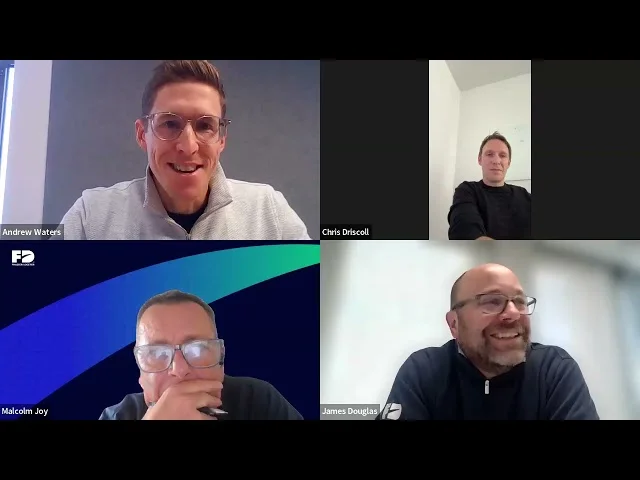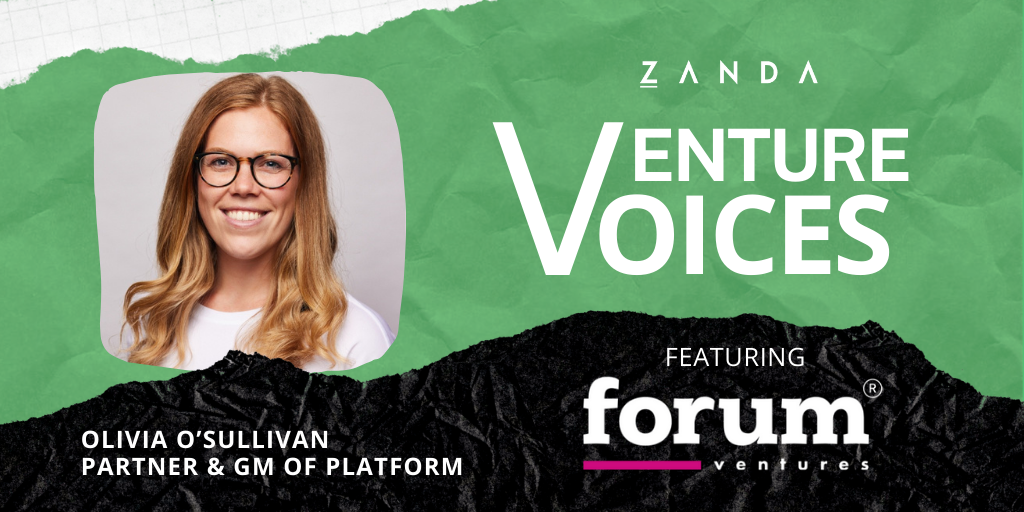
Venture Voices | Forum Ventures
15 Jul, 202410 minutes
Welcome to our new interview series, which we are kicking off by diving straight into the heart of venture capital with our first special guest, Olivia O’Sullivan, from Forum Ventures.
Forum Ventures® is a leading early-stage fund for B2B SaaS startups based in New York, San Francisco, and Toronto. Founded in 2014, Forum Ventures are on a mission to make the B2B SaaS journey easier, more accessible, and successful for early-stage founders.
Forum Ventures are a small team of B2B SaaS experts, operators, and founders with a passion for helping founders succeed on their journeys, especially those who are traditionally underrepresented. To date, they've made 400+ pre-seed and seed investment and those companies have gone on to raise $1B+ in follow on funding.
Forum Ventures

Thanks for joining us Olivia, would you mind introducing yourself and your journey to Forum Ventures.
Yes, I have been at Forum Ventures for the last five and a half years. Before Forum, I spent most of my career at the intersection of product and marketing, working in both large and small organizations to launch new products, services, and communities. My experience includes everything from McDonald's Dollar Menu and their mobile order and pay app to the Wall Street Journal's Journal House and various digital ad products. I thrive in the zero-to-one building phase, launching numerous initiatives from scratch.
Most recently, I managed product and innovation at Dow Jones, focusing on developing new products and services from the ground up. It was an exciting and rewarding role, and I love continuing this work with entrepreneurs at Forum.
Forum Ventures has recently just celebrated their 10-year anniversary, correct?
Yes, we actually did! Our CEO and Managing Partner, Mike Cardamone, saw an opportunity a decade ago to support SaaS companies at their earliest stages. He bet on the thesis that SaaS would continue to grow and took a chance on himself by raising a very small first accelerator fund. It's been incredible to see everything we've accomplished over the past ten years, and we're excited for what the next ten years will bring.
Quick test, off the top of your head, do you know how many companies Forum have invested in over the past ten years?
Yes, we just went through a whole website revamp, and in the process, we tallied up our numbers. We've funded 430 companies, which is incredible. These companies have collectively raised over a billion in follow-on funding. We've worked with many early-stage companies, and we're optimistic that this number will continue to grow. Currently, through our three funding vehicles, we're writing nearly 100 checks each year.

Diving deeper into Forum’s approach, the B2B SaaS market is quite saturated. How do you differentiate yourself in terms of operational support compared to other venture capitals in this space?
Absolutely. Our team is composed of former founders and operators, many of whom have started, scaled, and exited their own startups. We focus on two main areas to support our founders.
First, we emphasize go-to-market and sales acceleration. Many companies struggle to validate their problem, conduct effective customer discovery, and then successfully sell and grow their product. We spend considerable time teaching these fundamentals and providing hands-on support.
Second, we prepare founders for successful fundraising. While we have many experienced founders, we often back first-time founders for whom we may be the first institutional check. We guide them through creating compelling pitch decks, crafting strong business narratives, connecting with the right investors, and assembling data rooms—all the critical elements of the fundraising process.
On the studio side, our approach is slightly different since we are actively involved in building the product with a full engineering team. However, for companies in our accelerator and pre-seed fund, go-to-market and fundraising remain our primary focus areas.
With the current scrutiny on financial metrics and the focus on evaluating the financial worth, potential revenue and profitability of startups, how are you assessing these aspects within your current portfolio? Specifically, what metrics are you focusing on to determine financial health and potential upside?
We focus on several key metrics. We conduct quarterly reporting with our companies to continually monitor revenue growth and churned revenue. It's crucial to keep a close eye on burn rate and cash reserves, especially in today's challenging fundraising environment. Although we're starting to see positive signs, with more rounds being completed now than six months ago, maintaining financial health remains a priority.
We track churn closely, as it can be an early indicator of potential issues or stalling growth. Additionally, we pay special attention to cash on hand, burn rate, and runway to ensure companies have the resources they need to sustain and grow. By flagging any issues early, we aim to proactively address challenges and support our portfolio companies in navigating them.

Following up on that, when evaluating potential new investments, do you apply the same metrics as you do for your current portfolio companies, or do you provide a bit more leeway for these prospective investments?
I think there are a few important considerations. At the earliest stages, it's challenging to underwrite risk due to the limited data points available. We take pride in being the first institutional check into a business. If other VCs have told you that you’re too early, we’d love to talk to you. We aim to get in early and work closely with founders to accelerate traction so they can be in a strong position to raise larger funding rounds.
When evaluating potential investments, we focus on metrics like market size and the potential path to becoming a $100 million ARR business. While many businesses create tremendous value for their customers, not all are poised for venture-scale outcomes, and we are specifically in the venture business. We ask, "What needs to be true for this to become a $100 million business, and what does the path to get there look like?"
From a financial health perspective, especially with our accelerator fund where checks are $100,000, we also consider the current burn rate and runway of a company. We want to understand what $100,000 will achieve. Sometimes, $100,000 might only provide a couple of months of runway, but a company might need $300,000 to make substantial progress.
Given the current fundraising environment, it's not as easy as it used to be to secure additional funding, so we carefully consider whether the initial investment will enable the necessary progress.
What I wanted to cover next is the VC platform. Could you share your thoughts on the evolving role of the VC platform, how it's being measured, and how this has changed over the past twelve months?
Yeah, it's definitely evolved a lot over the past twelve months, and even more so in the last five years since I started in this field. Five years ago, many funds were inspired by the success of firms like Andreessen Horowitz and others that had rolled out robust support functions. Funds saw it as a significant differentiator and rushed to implement their own versions. Initially, these platforms often encompassed anything that wasn't strictly investing, aiming to support portfolio companies in any way possible.
I remember attending a VC platform summit years ago where they gave out tote bags saying, "Let me know how I can be helpful," which reflected the early mindset of being a catch-all for support. However, this approach could sometimes feel unstructured and chaotic, as it’s impossible to do everything well.
What we're seeing now is the maturation of the VC platform function. More people have gained perspectives on how these functions should be structured and managed. Many funds have appointed operating partners to oversee these efforts, leading to a wealth of case studies and best practices emerging in the industry.
As a platform leader, it's crucial to demonstrate clear impact on the metrics that matter most to the fund. Similarly, fund partners and managing partners are keen to allocate resources in ways that maximize outcomes for their portfolios.
On the fundraising side, there's growing scrutiny from LPs. Emerging managers are finding it increasingly challenging to secure funding for subsequent funds. This heightened scrutiny, however, is driving positive changes in the industry, encouraging funds to refine their operational strategies and demonstrate tangible results.
I'm particularly passionate about the professionalization of platform roles within VC firms. In fact, we're publishing an overview next week based on a survey I conducted about how different funds are measuring KPIs for their platform teams. It's encouraging to see that many funds are adopting clear KPIs focused on essential functions such as deal pipeline generation, revenue generation for portfolio companies, and investor engagement. This progress is truly exciting for the industry.

Building on that thought, how would you say your startups are currently benefiting from your platform approach?
Our platform approach is multifaceted, starting with our focus on sourcing. While this aspect doesn't directly impact our current portfolio, it plays a critical role in our strategy as a high-volume investor. Our goal this year is that 50% of our investments will originate via our platform efforts across marketing, community, partnerships, and events. We're actively engaging with the ecosystem through events and content to attract the best founders. Currently, we're at 42% for H1 and are confident about reaching our target by the end of the year.
On the other side, we place a strong emphasis on maintaining high founder NPS (Net Promoter Scores). We regularly survey founders to gauge their satisfaction and assess whether joining Forum has accelerated their business. Our support focus is on GTM/Sales and Fundraising.
For traction, we measure metrics such as initial revenue post-investment and growth trajectory over time. On the fundraising side, we measure our success by the number of meetings booked for founders, total investment secured across the supported companies, and our fund-through rate—the percentage of companies successfully transitioning to the next funding stage.
Ultimately, our goal is not only to prepare founders for fundraising but also to ensure they succeed in securing the necessary investments. We monitor both quantitative indicators and qualitative feedback to continually refine and enhance our support strategies.
Yeah, that's a great point. When you're inwardly focused on how to best support portfolio companies, it's equally important to consider external partnerships. Many companies are eager to collaborate and form partnerships with you. How do you evaluate which partnerships are most beneficial for Forum, and which ones will ultimately benefit your portfolio companies the most?
One of the ways we approach this is by identifying key inflection points or critical needs within our portfolio companies. For instance, our team often assists founders in refining their narrative and pitch decks. While we have expertise in this area, designing and polishing each slide isn't possible due to the volume of companies we support simultaneously. Many funds have dedicated in-house designers who excel at this, which we recognize as a valuable resource.
In such cases, we seek partnerships that can fill these gaps effectively. For example, we've previously partnered with designers in our network who have a proven track record with excellent feedback. We might connect our portfolio companies with these experts to enhance their pitch decks, ensuring they have a visually appealing design. Sometimes, this involves negotiating preferred pricing for our startups while sending them high-quality referrals.
We aim to drive tangible value for our founders by pinpointing these critical needs and aligning with the right partners. We're open to creative solutions that enhance our support capabilities and benefit our portfolio companies.

Earlier, you mentioned that Forum invests at a very early stage, often with first-time founders. How does Forum specifically nurture and develop these leaders, who may need support and growth, whether they're new to entrepreneurship or seasoned with multiple ventures under their belt?
One of our key evaluation criteria when considering potential investments is coachability. We prefer to be deeply involved with the companies we invest in, so during our assessment process, we look closely at whether founders are open to coaching and support. This is foundational for us. Transitioning from founder to CEO can be challenging for many in our portfolio, especially as they scale their teams and take on leadership roles within their organizations. We provide dedicated programming and resources to help founders navigate this transition, focusing on building strong company cultures and effective leadership skills.
Danny Pico, our Head of Platform, plays a crucial role in connecting our founder community. She facilitates interactions where alumni, who have successfully navigated later stages like Series B and beyond, share their insights and lessons learned. These interactions are invaluable for early-stage founders, offering candid advice on everything from scaling to fundraising strategies.
Looking ahead, we're focused on enhancing these connections further. For example, we're planning a gathering in September akin to a summer camp experience, where founders can relax, unwind, and connect with peers across our portfolio. Our goal is to foster an environment where founders can exchange experiences, learn from each other's challenges, and gain insights that can help them navigate their own entrepreneurial journeys more effectively.
In a challenging economy, startups that have solid runway, are on track for profitability, and boast significant clients can likely be selective about their VC partnerships rather than actively seeking funding. Is this focus on building community and platform strength driven by the need to attract such promising startups, especially given your impressive ten-year track record?
Yes, absolutely. We strongly believe that the platform we're building allows us to stand out among other funds, by providing exceptional support to our portfolio companies. But beyond differentiation, venture capital is deeply rooted in relationships and momentum. At Forum, we've backed founders across multiple ventures. For instance, we initially invested in a founder whose first business didn't succeed, but we maintained our relationship. We supported them again in their next venture, which was ultimately acquired by Doordash.
There's a significant interchange between investors becoming founders, LPs, or vice versa within our ecosystem. Our approach is guided by a philosophy of low ego and high emotional intelligence. We prioritize leading with value, whether it's for founders, investors, or enterprise customers. Our goal is to create non-transactional experiences that elevate and empower individuals.
We see this as a long-term investment in people and communities, similar to how tech ecosystems thrive in cities like San Francisco or New York. These communities benefit from founders reinvesting in the ecosystem after successful exits. Conversely, cities like Chicago, where this reinvestment is less frequent, haven't fully developed their tech city potential.
Our belief is simple: by consistently investing in people and ensuring every interaction with Forum leaves a positive, impactful impression, we cultivate lasting relationships and unexpected opportunities. Ultimately, we want everyone we engage with to feel that Forum genuinely cares about their success and growth.

It seems like Forum's brand recognition hinges on consistently delivering value across the board—offering the right network, infrastructure, and capital to support scaling. Like you mentioned, it sets off a snowball effect. Ensuring this value is consistently provided to all stakeholders is paramount.
Yeah, the world of venture can sometimes feel exclusive and adversarial, like it's 'us versus you.' Our goal is that every event, every interaction with us feels like we're sitting on the same side of the table, where you feel genuinely welcomed and valued.
The feedback we get about events for example, is always so positive—people say there are such welcoming vibes at Forum events. Our Events Managing, Nia Pryce, does an amazing job of cultivating this environment.. The core of it is really about showing up for founders and making a genuine impact. When people rave about us in the world, it's a testament to that authenticity. If we continue to deliver positive experiences and build authentic connections, investors will refer companies to us, founders will pitch us, and those we meet might become founders who choose Forum when they're ready to start their own ventures.
Many of our listeners today are founders eager to secure funding, especially from a respected investor like Forum. What advice would you give them on standing out in their pitch to you?
We're always eager to connect with founders who are passionate about their vision. You can reach out through our website or directly via email at [first name]@forumvc.com. We actively review inbound pitches and take many first calls, so don't hesitate to initiate contact. My advice for standing out in that initial conversation is to treat it like a first date—focus on crafting a compelling narrative. Practice explaining your problem statement, the market opportunity, and how your solution addresses it, along with early indicators of success. Being clear and concise about your story will pique our interest and lead to further discussions.

How crucial is it to craft a compelling narrative? What makes a story convincing enough to attract investment?
As a founder, you'll need to tell compelling stories to recruit your early employees away from secure jobs to join your unproven venture. You'll need stories to persuade customers about the future and why they should choose your product or service. As a CEO, storytelling is a significant part of your role. People often make emotional decisions, later rationalizing them with data. Think about your own decision-making; many are likely rooted in emotion. When you convey that emotion to an investor, you're tapping into why you started this company in the first place. Every founder has a story—a reason they took this risk. Sharing that story is immensely powerful, far more than simply presenting slides and talking through numbers
And if you weren’t in the world of venture capital, where would you be?
If I were to realistically consider a different path outside of venture capital, I'd likely gravitate towards roles in operations, marketing, or as a chief of staff. These are areas that I find particularly interesting and where I believe I could bring valuable skills. Specifically, I'm intrigued by opportunities within the healthcare sector, as it's a field I'm passionate about exploring further.
In a more fantastical scenario, I enjoy running ultramarathons in my spare time, so perhaps a professional trail runner would be an amazing pursuit.
Just one final question, Olivia. Are there any podcasts or books you're currently finding particularly valuable for someone looking to build or lead a tech community?
The book I'm currently reading isn't directly related to the tech community; it's 'The Martian Chronicles' by Ray Bradbury. Despite its sci-fi theme about exploring new frontiers like Mars, it offers intriguing insights into human exploration and conquering new territories, which can resonate metaphorically with entrepreneurial journeys.
Another podcast I find useful, especially for founders wanting to understand investor perspectives, is 'The Pitch.' It provides a transparent look into how investors evaluate pitches, the types of questions they ask, and their decision-making process. It's a live format where founders pitch their startups, receive immediate feedback, and sometimes secure investment, offering a valuable glimpse behind the scenes of early-stage investing.


